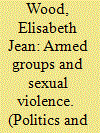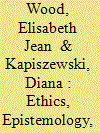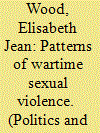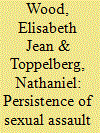|
|
|
Sort Order |
|
|
|
Items / Page
|
|
|
|
|
|
|
| Srl | Item |
| 1 |
ID:
086654


|
|
|
|
|
| Publication |
2009.
|
| Summary/Abstract |
This article explores a particular pattern of wartime violence, the relative absence of sexual violence on the part of many armed groups. This neglected fact has important policy implications: If some groups do not engage in sexual violence, then rape is not inevitable in war as is sometimes claimed, and there are stronger grounds for holding responsible those groups that do engage in sexual violence. After developing a theoretical framework for understanding the observed variation in wartime sexual violence, the article analyzes the puzzling absence of sexual violence on the part of the secessionist Liberation Tigers of Tamil Eelam of Sri Lanka.
|
|
|
|
|
|
|
|
|
|
|
|
|
|
|
|
| 2 |
ID:
186670


|
|
|
|
|
| Summary/Abstract |
The political science discipline has recently engaged in contentious debate about the value of “research transparency,” particularly for research with human participants. The discipline is also holding vital conversations about research ethics and is rekindling dialogue about different ways of knowing. We offer an integrated account of how the actions that scholars who conduct human participant research take to respect ethical principles (which vary by research substance and settings), and their epistemological commitments (which vary across researchers), influence openness, a broader concept than “transparency.” These principles and commitments shape scholars’ openness practices simultaneously—both independently and in concert—serving as a prism through which multiple features of a research project are refracted, and resulting in a scholar’s inclination and ability to pursue openness in different ways and to different degrees with the audiences of her work. We also show how ethical principles and epistemological commitments can not only constrain and prevent openness, but also animate and require it. We suggest that scholars pursuing openness ethically, and in ways that honor their epistemological commitments, represents good social science, and we offer strategies for doing so. To develop our argument, we focus primarily on two research methods, ethnography and interviews, and on openness toward two audiences, human participants and research communities. Our account illuminates how the heterogeneity of human participant research makes it inappropriate, indeed impossible, to develop blanket rules for pursuing openness. Throughout, we highlight the importance of reflexivity for the ethical conduct of, and for being ethically open about, political science research.
|
|
|
|
|
|
|
|
|
|
|
|
|
|
|
|
| 3 |
ID:
128868


|
|
|
|
|
| Publication |
2014.
|
| Summary/Abstract |
How important is ideology for the analysis of civil war? In contrast to literature that neglects ideology in its emphasis on structural variables or situational incentives, this article argues for the recognition of its essential role in the functioning of armed groups if they are to explain observed variation in armed group behavior. For example, sidelining ideology leaves major phenomena unexplained, including both mass killing and restraint in violence against civilians. Ideology is defined as a set of more or less systematic ideas that identify a constituency, the objectives pursued on behalf of that group, and a program of action (perhaps only vaguely defined). Ideology matters in two ways. First, it has instrumental value for armed groups, socializing combatants with heterogeneous motivations into a coherent group, dampening principal-agent problems, prioritizing competing goals, and coordinating external actors including civilians. Ideologies differ in the kind of institutions and strategies they prescribe for meeting these challenges and in the extent to which they do so. Yet this first approach is incomplete, as ideology has more than instrumental value. Members of some armed groups act on normative commitments in ways not reducible to instrumental reasoning, and some groups constrain their strategic choices for ideological reasons, often normative concerns prescribed by their ideology. Some groups, for example, engage in restraint, declining to use violence though it would have strategic benefit. The conclusion lays out a twin-fold research agenda: a 'weak program' that analyzes the instrumental adoption of ideology and a 'strong program' that explores normative commitments based on particular ideologies and on social preferences.
|
|
|
|
|
|
|
|
|
|
|
|
|
|
|
|
| 4 |
ID:
086647


|
|
|
|
|
| Publication |
2009.
|
| Summary/Abstract |
Sexual violence incuding rape, sexual torture, sexual slavery, and forced abortion is a common form of violence against some of the most vulnerable civilians during war. As a result of the mobilization by women's groups advocating prosecution of rape in Bosnia and Rwanda, international legal authorities now prosecute various forms of sexual violence as war crimes, as crimes against humanity, and, in some contexts, as genocide.
|
|
|
|
|
|
|
|
|
|
|
|
|
|
|
|
| 5 |
ID:
155196


|
|
|
|
|
| Summary/Abstract |
What accounts for the puzzling persistence of sexual assault of both women and men within the ranks of the US military? Despite increasing efforts to end this intraforce violence, sexual assault of women persists at levels comparable to those in the civilian population and significantly higher than that of other crimes (data challenges prevent comparing rates for men). Drawing on recent analysis of rape as a practice rather than a strategy of war, we suggest the answer lies in the socialization not only of recruits but also of officers. We draw on an original typology of socialization processes and analysis of four well-documented cases to suggest the following account of why sexual assault persists. First, informal socialization processes (including sexualized hazing) trivialize sexual harassment and assault, establish assault as an appropriate form of punishment (including of those transgressing military gender norms), and license retaliation against victims who report. Second, officers sometimes sexually harass and assault subordinates, thereby endorsing similar acts by servicemembers under their command. Third, formal socialization processes of enlisted men and women, despite recent reforms, continue to reproduce a masculinity that undermines policies that seek to prevent sexual assault, in part because it fails to override these unauthorized and illegal socialization processes. Finally, the socialization of officers, combined with problematic incentive structures, undercuts efforts to end the de facto tolerance of sexual abuse by many officers. In our emphasis on horizontal as well as top-down socialization processes, and on those that subvert official policies as well as those that seek to inculcate them, we also contribute to scholarly understanding of socialization within organizations more generally.
|
|
|
|
|
|
|
|
|
|
|
|
|
|
|
|
| 6 |
ID:
094743


|
|
|
| 7 |
ID:
156159


|
|
|
|
|
| Summary/Abstract |
To leverage the full range of observed variation in patterns of violence toward the development and testing of theories of political violence, scholars need adequate conceptual foundations: what should we mean by a pattern of violence on the part of an armed organization? Scholars often distinguish degrees or levels or types of violence across organizations and conflicts, but definitions and measures vary sharply. We argue that patterns of violence are not reducible in ways often assumed in the literature: lethal violence is not a good proxy for the overall pattern, and differences in patterns are not well captured in the binary “terror” versus “restraint.” To address these concerns, we provide a new conceptualization of political violence, defining an organization’s pattern of violence as the configuration of repertoire, targeting, frequency, and technique in which it regularly engages. This approach adds precision to the documentation and analysis of political violence, clarifies the evaluation of rival theories, and opens up new research questions. We demonstrate its utility through an analysis of violence against civilians in Colombia, drawing on an original database of massacres, judicial proceedings, and other sources, and show that the concept of “pattern” helps bring ideology and politics back into the analysis of organized violence.
|
|
|
|
|
|
|
|
|
|
|
|
|
|
|
|
|
|
|
|
|